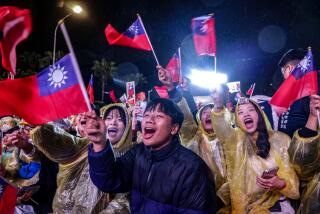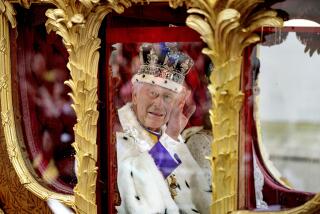COLUMN ONE : Breezes of Change in Tonga : A benevolent king is the big man in the tiny island nation. But democratic ideas are in the South Pacific air. Whatever happens, it’s likely to be at the usual speed.
- Share via
NUKUALOFA, Tonga — A rough current was slowing the royal exercise.
Hidden behind huge black goggles, his enormous bulk swaddled in a striped blue polo shirt and shorts, a blue cap pulled low on his face, 73-year-old and 300-pound King Taufa’ahau Tupou IV strained at the oars of his small wooden skiff.
Between strokes, the massive monarch paused to check his course by peering up at an oversized rear-view mirror mounted on the stern. Waves slapped the trademark emblem of a New Zealand chocolate drink emblazoned on the bow, rocking the fragile craft.
Nine soldiers with yellow braid and white spats followed at a respectful distance in a motorboat. Guards manned the stone pier, ready to dive in if necessary. Court chamberlains and ladies, wearing woven mats around their own ample bellies out of respect for the occasion, fretted from the harbor shore.
After 20 minutes, the royal ordeal was over. Soldiers splashed alongside to steady the boat and help the aging ruler shuffle ashore. Others helped His Majesty step on a red-carpeted box and climb into a blue van with a vanity plate--HM-1. Two motorcycle police in leather jackets and shiny knee-high boots led the convoy off with flashing blue lights.
Soon, the sinking sun set the tropical sky ablaze in orange and gold. A gentle breeze rustled the coconut palms and thick hibiscus. Giant fruit bats called flying foxes glided silently overhead. Fishermen tossed swirling nets into turquoise waves. A dog lay down on the road. Another quiet day eased to a close in the sleepy capital of the ancient and peaceful kingdom of Tonga.
But political currents are also a little rough these days in this far-flung South Pacific island nation. For the first time, the tide of democracy that has toppled governments and rulers around the world is washing up here as well, eroding the very foundations of the Victorian, red-roofed royal palace where the king dispenses nearly absolute rule over his 105,000 increasingly restless subjects.
“Change is coming,” warned Khalafi Moala, editor of the Independent Times of Tonga. “The only question is whether it will be evolution or revolution.”
“There are cries from the people,” agreed Laki Niu, one of nine commoner members of the Legislative Assembly, whose one-room white building resembles a church in a New England whaling town. “There is corruption in high places. Misuse of public funds. Failure to govern properly. And failure to deliver services. The people are crying for better government.”
Strong language, perhaps, but these are stirring times in the Pacific’s last kingdom. The monarch traces his lineage back 1,000 years, and except for the arrival of Methodist missionaries in the last century, remarkably little seems to have changed. There are still no stoplights, no television, no U.S. Embassy and virtually no violent crimes.
Literacy is high, and health care is good. Life is easy in a land where the radio forecasts only three kinds of weather: fine, mostly fine and very fine. “There is no time in Tonga,” sighed a Fijian businesswoman here. “Make an appointment. Maybe they come an hour late. Maybe they don’t.”
If they do, they tend to be big. Like the 6-foot-3 monarch, who has slimmed down from his former 400-plus pounds, Tongans are king-sized. At Pacific Fashions, one of the largest stores on Nukualofa’s four-block main street, men’s shirts are sold in only three sizes: large, X-large and XX-large.
There are also virtually no checks on the king’s power.
“He’s a benevolent dictator, if you like,” said a diplomat based here. “He’s all-powerful. And he wants what’s best for his people. But he’s increasingly out of touch. And he’s taken in by all these carpetbaggers and con men who come in with crackpot ideas. Somehow, they all get into the palace.”
There was the king’s proposal to import 30 million tires from Seattle to burn for fuel. His endorsement of a 200-bed tourist hotel in a swamp. His plans to turn an atoll into an American toxic waste dump, to build an oil depot on an active volcano, to construct a nuclear power plant in a nation with no industry. None of the deals ever got past the talking stage.
Except one. In the mid-1980s, the king secretly authorized the sale of passports abroad at prices ranging up to $50,000. Among the 426 residents of Hong Kong, South Africa, Libya, Taiwan and other countries who bought or received Tongan passports, according to government records, were Imelda Marcos, the exiled former first lady of the Philippines, and two of her children.
When news leaked out, the response was dramatic. Worried Tongans gathered around communal bowls of kava, a bitter-tasting alcoholic drink made from crushed roots, to ask if Marcos and other rich foreigners were coming to take over the only Pacific nation that has never been invaded, conquered or colonized.
Finally, the king responded. He told an interviewer last January that passport sales had netted $20 million. He said he deposited the money in a Bank of America trust account in San Francisco. “Otherwise, the government would just spend it,” he explained.
Tongan society is based on consensus, not confrontation, and absolute respect for the absolute monarch. So, it was a historic day when the leader of the pro-democracy forces, ‘Akilisi Pohiva, stood up in the Legislative Assembly--and went to court--to challenge the king’s account and demand an audit. He’s still waiting.
“Nobody can tell how many passports were sold,” Pohiva said recently. “No one can say how much money was made. All we want is accountability.”
That may not sound radical, concedes Futa Helu, head of Atenisi Institute, Tonga’s only university. “But it’s revolutionary in this society. When he says ministers should be accountable, it’s like dropping a bomb.”
But the real bombshell was to come. In March, after the government hurriedly amended the constitution to retroactively legalize passport sales, Pohiva and several senior members of the clergy led as many as 1,500 supporters on an unprecedented march on the royal palace.
This being Tonga, the protesters didn’t storm the gates. Instead, they stopped politely outside and quietly delivered petitions to a secretary. They then held a prayer service and went home. Even though the king never publicly acknowledged their presence or petitions, it was a watershed.
“No one had ever stood out to criticize the king,” said another diplomat. “The monarchy is sacrosanct.”
And, quietly, there were changes. The king’s brother, whom many saw as a block to reform, resigned in August as prime minister. His replacement, the king’s cousin, is considered more progressive. And an independent court of appeals was introduced, with judges imported from other Commonwealth countries. (Until independence in 1970, Tonga was under British control for most of this century.)
“That was very important,” the diplomat said. “The little guy who in the past had been found guilty of a crime could only appeal to the king’s privy council of ministers. And the judge might be the person at fault. So, there was no real justice in the final stage.”
The king appoints his ministers for life from Tonga’s 33 feudal families. Angry critics point to the ministers’ frequent first-class travel, their ubiquitous gunmetal gray Mercedes-Benz 230E sedans and their lavish homes abroad. Many “are perceived by the reformers and their sympathizers as undisciplined, greedy and lazy,” noted a 1988 report on Tonga by the California-based RAND Corp.
More important, under a constitution written in 1875 by a British missionary, the king and the hereditary nobles control virtually all land and power. Together, they hold 21 of 30 seats in the legislature. Only nine members are elected to represent the rest of the population.
Hon. Chief Fusitu’a, Speaker of the assembly and one of the most powerful nobles, concedes that “to a non-Tongan mind, it seems very unfair.” But Tonga’s culture has endured because of the monarchy and the system of chiefs, he said. Destroy it “and there will be chaos.”
Few opponents want to end the monarchy, however. Most prefer a British-style sovereign and parliamentary democracy.
“It’s a basic human-rights question,” said Bishop Patelisio Finau, head of Tonga’s 15,000 Catholics. “People need better representation so their voices can be heard. That’s why what is happening in so many parts of the world is happening here.”
Actually, what happens here still seems unique.
Ever since Capt. James Cook first explored the 500-mile-long archipelago two centuries ago and named it the Friendly Islands, Tonga has survived in a kind of time warp. Its best-known footnote in history came in 1789, when Fletcher Christian led his mutiny on the Bounty off the island of Tofua.
Off the main Pacific trade and tourist routes, most Tongans still live much as their ancestors did, quietly focusing on fishing, farming and preparing suckling pig for feasts. An estimated 3,000 pigs are slaughtered each weekend for festivals and feasts.
On Sundays, virtually everyone goes to church, and the graceful harmonies of countless choirs echo gently across the reefs. All entertainment, sport and commercial activity is banned. Taxis won’t drive, planes can’t fly, and it’s illegal to write a check.
The economy depends on $50 million in remittances sent from Tongans in California, New Zealand and Australia. Foreign aid and concessionary loans also are key although there’s a rising enthusiasm for cultivating squash. Last year, Tonga exported $3 million worth of squash; this year, the country hopes to triple that amount.
The move to a cash economy, combined with the growing number of Tongans living and studying overseas, has increased pressure for democracy.
For now, many say real change is likely only when the aging king passes on. His heir, Crown Prince Tupouto’a, 43, is an unmarried, Sandhurst-educated jet-setter with a reputation as a playboy. Now minister of foreign affairs and defense, he has denounced his father’s critics as “communists” and “agents of the Vatican” and says he has no plans to institute reforms.
Still, the turmoil has quieted down recently. The pro-democracy leaders seem willing to wait. Tonga, after all, moves at its own pace.
“It will all happen,” said one diplomat, as a ceiling fan churned the sultry air. “In our terms, perhaps, things are very slow. In Tongan terms, however, change is happening at breakneck speed.”
More to Read
Sign up for Essential California
The most important California stories and recommendations in your inbox every morning.
You may occasionally receive promotional content from the Los Angeles Times.











